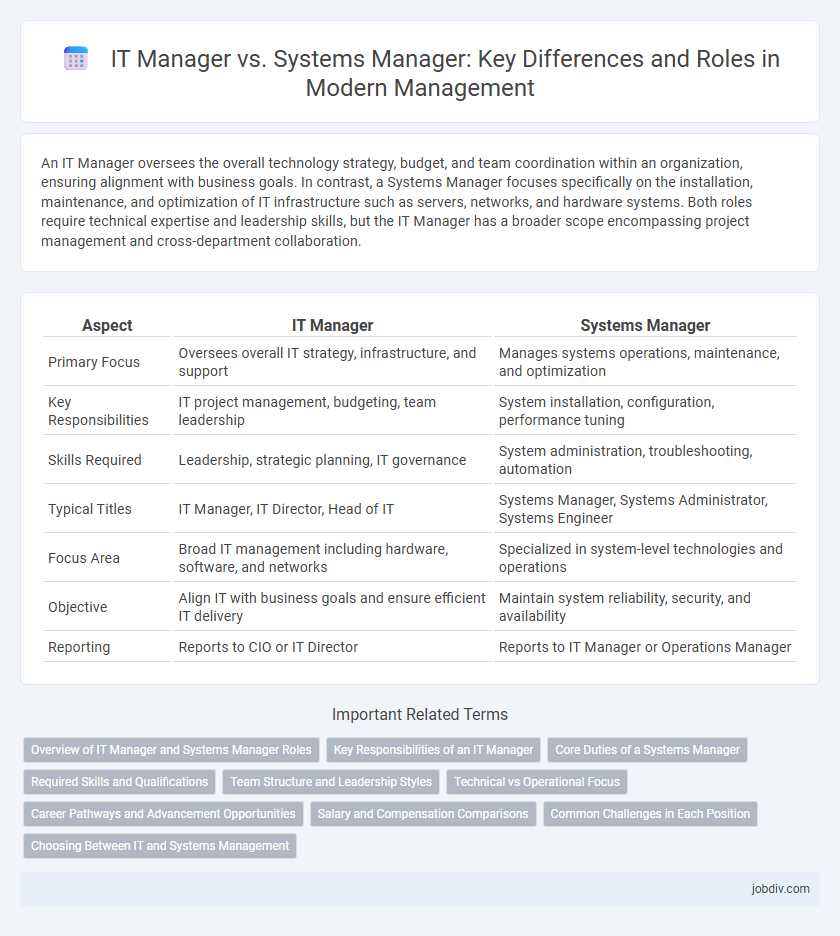An IT Manager oversees the overall technology strategy, budget, and team coordination within an organization, ensuring alignment with business goals. In contrast, a Systems Manager focuses specifically on the installation, maintenance, and optimization of IT infrastructure such as servers, networks, and hardware systems. Both roles require technical expertise and leadership skills, but the IT Manager has a broader scope encompassing project management and cross-department collaboration.
Table of Comparison
| Aspect | IT Manager | Systems Manager |
|---|---|---|
| Primary Focus | Oversees overall IT strategy, infrastructure, and support | Manages systems operations, maintenance, and optimization |
| Key Responsibilities | IT project management, budgeting, team leadership | System installation, configuration, performance tuning |
| Skills Required | Leadership, strategic planning, IT governance | System administration, troubleshooting, automation |
| Typical Titles | IT Manager, IT Director, Head of IT | Systems Manager, Systems Administrator, Systems Engineer |
| Focus Area | Broad IT management including hardware, software, and networks | Specialized in system-level technologies and operations |
| Objective | Align IT with business goals and ensure efficient IT delivery | Maintain system reliability, security, and availability |
| Reporting | Reports to CIO or IT Director | Reports to IT Manager or Operations Manager |
Overview of IT Manager and Systems Manager Roles
An IT Manager oversees the organization's technology strategy, ensuring the alignment of IT infrastructure with business goals while managing budgets, teams, and project lifecycles. Systems Managers focus on the deployment, maintenance, and optimization of network and system hardware and software to guarantee operational efficiency and security. Both roles require strong leadership and technical expertise but differ in scope, with IT Managers handling broader strategic initiatives and Systems Managers concentrating on day-to-day system performance and reliability.
Key Responsibilities of an IT Manager
An IT Manager oversees the strategic planning, implementation, and maintenance of an organization's information technology infrastructure, ensuring alignment with business goals and security protocols. Key responsibilities include managing IT teams, budgeting for technology investments, coordinating system upgrades, and overseeing network administration, cybersecurity measures, and end-user support. Unlike a Systems Manager who focuses primarily on system operations and technical maintenance, the IT Manager plays a critical role in IT governance, policy development, and cross-departmental technology integration.
Core Duties of a Systems Manager
Systems Managers oversee the implementation, maintenance, and optimization of an organization's IT infrastructure, ensuring seamless network operations and system security. They manage server configurations, monitor system performance, and coordinate IT support teams to resolve technical issues effectively. Their core responsibilities include disaster recovery planning, software updates, and compliance with cybersecurity protocols to maintain system reliability and data integrity.
Required Skills and Qualifications
IT Managers must possess strong project management skills, proficiency in network infrastructure, and expertise in cybersecurity protocols, typically requiring a bachelor's degree in Information Technology or Computer Science and relevant certifications such as PMP or CISSP. Systems Managers require deep knowledge of operating systems, server hardware, and system integration, often holding degrees in Computer Science or Information Systems supplemented by certifications like Microsoft Certified Systems Engineer (MCSE) or Red Hat Certified Engineer (RHCE). Both roles demand excellent leadership, problem-solving abilities, and experience with vendor management and strategic planning in technology environments.
Team Structure and Leadership Styles
IT Managers typically oversee broader organizational technology strategies, leading cross-functional teams with a focus on collaboration and innovation. Systems Managers concentrate on the technical operations and infrastructure, managing specialized teams that prioritize system reliability and efficiency. Leadership styles of IT Managers emphasize transformational and strategic guidance, while Systems Managers often adopt a more transactional and detail-oriented approach.
Technical vs Operational Focus
IT Managers prioritize technical expertise, overseeing software development, network architecture, and cybersecurity measures to ensure robust technology infrastructure. Systems Managers concentrate on operational efficiency, managing day-to-day system performance, resource allocation, and maintaining service continuity across IT environments. The IT Manager's role centers on innovation and technical problem-solving, while the Systems Manager emphasizes system reliability and operational workflow optimization.
Career Pathways and Advancement Opportunities
IT Managers focus on overseeing technology infrastructure and team coordination, often progressing into roles like Chief Information Officer (CIO) or IT Director. Systems Managers specialize in managing and optimizing computer systems, with career advancement leading toward Senior Systems Architect or IT Operations Manager positions. Both pathways require strong leadership, technical expertise, and strategic planning skills for higher-level management roles.
Salary and Compensation Comparisons
IT Managers earn an average salary ranging from $90,000 to $140,000 annually, depending on experience and company size, while Systems Managers typically receive between $85,000 and $130,000. Compensation packages for IT Managers often include performance bonuses, stock options, and comprehensive benefits, reflecting their strategic role in overseeing information technology infrastructure. Systems Managers may receive slightly lower base pay but benefit from targeted incentives and professional development allowances linked to system optimization and maintenance responsibilities.
Common Challenges in Each Position
IT Managers often face challenges such as aligning technology strategies with business goals and managing diverse teams across multiple projects. Systems Managers typically struggle with maintaining system reliability, overseeing infrastructure upgrades, and ensuring cybersecurity compliance. Both roles require balancing technical expertise with leadership skills to address evolving organizational demands.
Choosing Between IT and Systems Management
Choosing between IT Manager and Systems Manager roles depends on the organization's core needs: IT Managers oversee technology strategies, align IT infrastructure with business goals, and manage diverse teams handling software, hardware, and network operations. Systems Managers concentrate on maintaining and optimizing system performance, focusing on servers, databases, and system integration to ensure operational stability and efficiency. Evaluating the company's priorities for innovation versus system reliability guides the decision between strategic leadership in IT management and specialized expertise in systems management.
IT Manager vs Systems Manager Infographic

 jobdiv.com
jobdiv.com